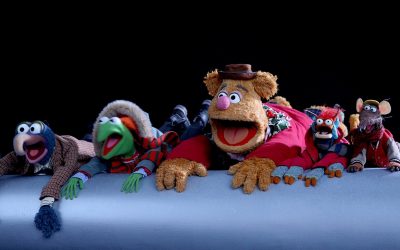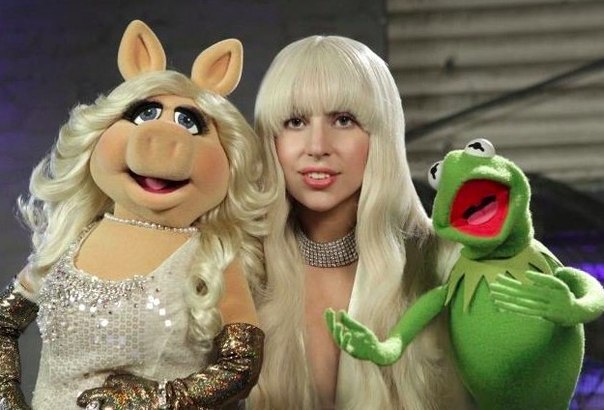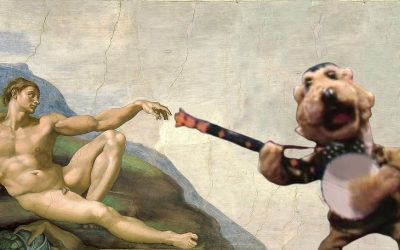I love the Muppets. I know I don’t share as many Muppet videos on Facebook these days. I lurk more than post on the ToughPigs forums. I haven’t given a drunken (or sober) rant about the 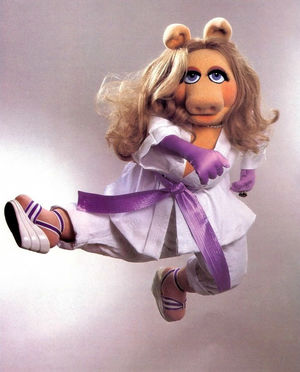 importance of Gonzo in over a year. My next planned tattoo will be the first one I get that has nothing to do with Jim Henson.
importance of Gonzo in over a year. My next planned tattoo will be the first one I get that has nothing to do with Jim Henson.
But that doesn’t change how big of a place the Muppets have reserved in my heart. It’s no exaggeration when I say Muppets have saved my life time and time again. A friend once asked me, as we devoured slices of pizza at midnight in New York City, “Why Muppets?” and all I could muster was, “They’re such good. There is no greater good.”
Okay, okay. Maybe this tone is a bit serious to kick off a piece with, but I need you to know how important anything Jim Henson touched is to me before we get into the thick of it.
I say all of this at the get-go because, hi, I’m Julia, I identify as a woman, have all of my life, and being a woman it’s impossible to not speak up when my favorite franchises let me down. I can’t watch any film or TV show these days without questioning if it’s going to pass the Bechdel Test, let alone give me even one relatable female character who isn’t just a walking stereotype.
(I will note now, at the start, that I am a cis, white woman, and there are even more people who see less of themselves on screen than I do. As that is not my story to tell, I will focus on my personal experience. But y’all, we have so much work to do for women of color, queer folks, and trans/nonbinary people.)
So when I watch any Muppet movie or show – which I do often and love so much – I can’t help but not see myself represented.
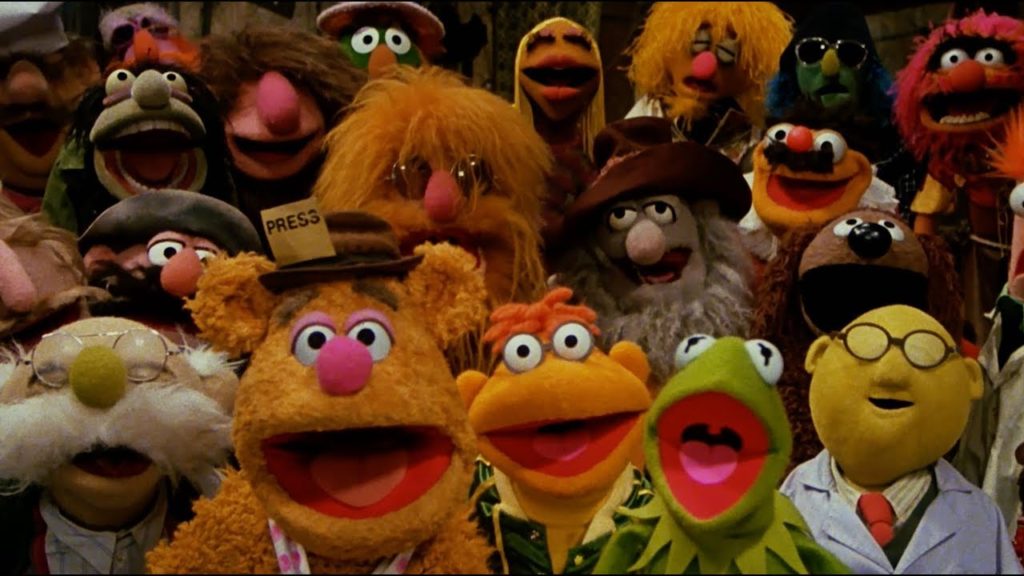
One woman in a sea of men. I feel for you, Janice.
The response I know some of you are thinking: But Julia! They’re Muppets! None of us are represented by frogs or bears or whatevers! Come on!
Point taken, but at the end of the day, those characters listed are all still male. So are the vast majority of the other Muppets.
In this day and age, we all know representation is important; it matters. While many people come to The Muppets in hopes of escaping boring everyday life, it’s still important for them to see 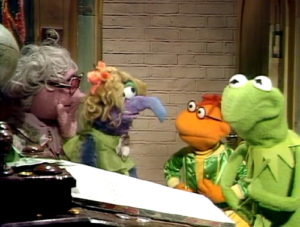 themselves in some facet or another. Yes, I can look at Gonzo and say “I too follow crazy whims at times” or “like Walter, I love the Muppets so very much” – that’s great. But when a franchise not only doesn’t show me represented but almost seems to go out of their way to not create new female characters over and over again… well, it gets a bit disheartening.
themselves in some facet or another. Yes, I can look at Gonzo and say “I too follow crazy whims at times” or “like Walter, I love the Muppets so very much” – that’s great. But when a franchise not only doesn’t show me represented but almost seems to go out of their way to not create new female characters over and over again… well, it gets a bit disheartening.
So let’s take a(n albeit brief) look into the history of the Muppets, and how it is they need to do better by their female characters.
Starting with The Muppet Show, we arguably got one main female character: Miss Piggy. Sure, more characters appeared as the series progressed, but they were few and far between. Of the handful of reoccurring female characters, only three were actually performed by women – Annie Sue, Hilda, and Wanda (Hilda, I will note, was the only one who was actively present on stage and backstage). Compared to the endless list of male Muppets, it’s more than a bit absurd that I can count the reccurring female Muppets on both my hands. Of course, this comes down to the fact that the brunt of the perfor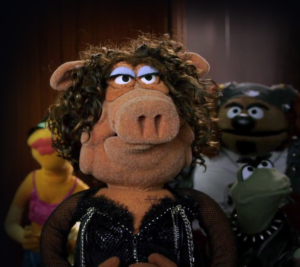 mers were male, but we’ll get to that later.
mers were male, but we’ll get to that later.
But this was over 35 years ago, right? Things surely have gotten better.
Well, let’s look at the most recent Muppet films and the latest TV show in comparison. Between the three, we received the new characters Miss Poogy and Denise… and that’s sort of it. Neither of which got the same amount of press and screen time as, say, Walter or Constantine, who both were practically the leads of their own films.
Yes, the TV show gave us a revival of Yolanda, which was great. She was allowed to actually have a personality and be grounded as a character. That said, in the grand scheme of the show, we still didn’t get that many story lines involving Yolanda, and we saw the revival of Uncle Deadly far more. Janice was present, but mostly either only took part in the scenes with the rest of the Mayhem or served as (groan) a love interest (which, okay, I will totally admit to liking that plot point because I enjoyed getting to see another side of Sam, but still, it would’ve been nice if Janice had done more).
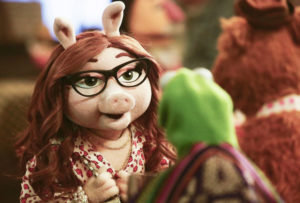 Then of course there’s Denise. I knew, from the get-go, that she and Kermit were going to head towards splitsville at some point during season one in favor of a Piggy/Kermit reunion. (I so distinctly remember when Disney was promoting the Piggy/Kermit breakup and non-Muppet fan friends were asking why I wasn’t more upset. My response: “They’re obviously going to get back together?? Calm down???”) I could live with that. My sole hope was that the showrunners were going to develop Denise enough that she could become a favorite and, after the break up, stay on the show as a reoccurring character. But I guess that was too much to hope for.
Then of course there’s Denise. I knew, from the get-go, that she and Kermit were going to head towards splitsville at some point during season one in favor of a Piggy/Kermit reunion. (I so distinctly remember when Disney was promoting the Piggy/Kermit breakup and non-Muppet fan friends were asking why I wasn’t more upset. My response: “They’re obviously going to get back together?? Calm down???”) I could live with that. My sole hope was that the showrunners were going to develop Denise enough that she could become a favorite and, after the break up, stay on the show as a reoccurring character. But I guess that was too much to hope for.
While they did do some character building with Denise in the later episodes, after her and Kermit’s breakup she disappeared from the show. And hey, maybe if the show had continued she could have come back as a regular, but that wasn’t the feel I got. Ultimately, Denise only served as a vehicle to drive Piggy and Kermit apart and then back together. She was nothing but a plot device, which really gets my goat. She could’ve had an episode or two focused on her. She could’ve built a friendship with Piggy – or any Muppet, for that matter (I would’ve loved a Denise-Scooter platonic 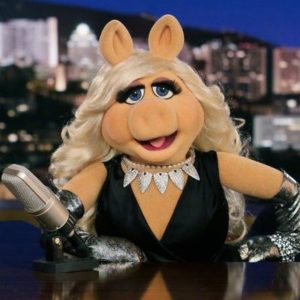 friendship!). Yet, only being in six out of sixteen episodes, we never got that with Denise.
friendship!). Yet, only being in six out of sixteen episodes, we never got that with Denise.
And then there’s the diva herself. In the future I would love to tackle the treatment of Miss Piggy over the years much more thoroughly. To save on both our time, I won’t go as in depth, but I will say, in my opinion, the treatment of Miss Piggy hasn’t changed much over the years. In the Teresa Brewer Muppet Show episode, which I reviewed at the end of last year, the entire main plot revolved around how Piggy was too fat to do her ballet number. As I said in that review:
“I know that this show came out in a different time, and I know that Miss Piggy is, well, a pig and pigs are seen as fat creatures. But when you have a show with so few female characters to begin with – and really only one who regularly gets featured – the fact that she has an entire episode focused on her appearance is, unfortunately, super sexist. The Muppets has always been a boys’ club, but it’s when Piggy is treated in this manner that this becomes glaringly obvious time and time again.”
The problem is, Piggy’s weight has been a reccurring joke over the years, not staying where it belongs back in the 70’s. On The Muppet Show Piggy stepped on a scale and broke it – on The Muppets (2015) a cable that could support a wrecking ball couldn’t support Piggy. In an old 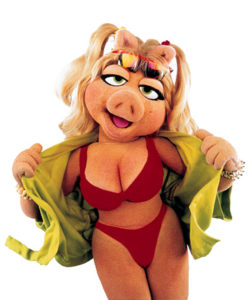 ‘Pigs In Space’ the Swinetrek tipped towards whatever side of the ship Piggy stood on – in one of the newer ‘Pigs In Space’ everyone becomes weightless except for Piggy. Piggy’s history is littered with jokes about her weight and appearance.
‘Pigs In Space’ the Swinetrek tipped towards whatever side of the ship Piggy stood on – in one of the newer ‘Pigs In Space’ everyone becomes weightless except for Piggy. Piggy’s history is littered with jokes about her weight and appearance.
Not that it’s the only time the Muppets have made a pig’s defining feature be her appearance. Need I remind you of Spamela Hamderson, whose sole purpose was to have boobs? Yeah, I’m still pretty ticked off about that one.
But let’s look away from even just the sheer fact that, to this day, they’re still using Miss Piggy’s weight to get a laugh. While Piggy has certainly grown as a character over the years, being at times a fabulous diva and at other times incredibly vulnerable, there are still many problems in how she’s presented. Many of the female guest stars on The Muppets (2015) were there to make Piggy jealous or to act as a rival of sorts with her. We see Piggy proclaiming that she’s a strong, independent woman, only to have so many of her actions revolve around Kermit and his needs. In the episode ‘Got Silk?’ we see Piggy 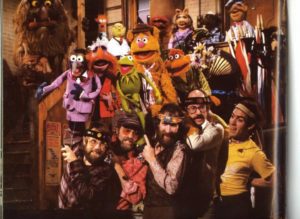 attempt to bond with another lady on the show (Janice), but in the end she forgoes that friendship to focus on her relationship with Deadly – and yes! It’s wonderful to see a female-male platonic friendship being portrayed, but that doesn’t excuse the fact that Piggy has literally no female friends.
attempt to bond with another lady on the show (Janice), but in the end she forgoes that friendship to focus on her relationship with Deadly – and yes! It’s wonderful to see a female-male platonic friendship being portrayed, but that doesn’t excuse the fact that Piggy has literally no female friends.
A large problem in the portrayal of Piggy – and all the other lady characters within the Muppets – is that … well … the performers, writers, and producers? An overwhelming majority of them are dudes.
It’s hard to think of Miss Piggy as a “feminist icon” when there’s always been a man underneath playing her (even if he is a pretty nice, progressive guy). At this point I don’t know if the role of Miss Piggy could be handed over to a woman, but surely they could create more characters for female performers to play, both major and minor. We typically don’t get focus on female friendships or female story arcs because, at the top of things, men are running the show; when we do get arcs they’re often tropey and worthy of an eye roll. This is not to say that the Muppet showrunners aren’t cognizant of this and 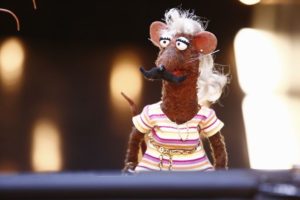 aren’t making attempts to improve, but at the end of the day, they can – and need to – do better by women.
aren’t making attempts to improve, but at the end of the day, they can – and need to – do better by women.
Yes, The Muppets (2015) brought on Julianne Buescher to play Denise and Yolanda, and there were a handful of women writers and producers behind the scenes. But there still needs to be more of a push to bring forward women from the background and create new, likable characters. We need female performers and female writers creating female characters.
As quoted by my friend Scott, when I asked him who his favorite underrated female Muppet is for another article this week:
“It’s really tough to find a female character in the Muppets who isn’t just a caricature of what men see as typical “female” traits. Since, of course, nearly every Muppet writer (with some exceptions) has been a man.”
I couldn’t agree more, Scott.
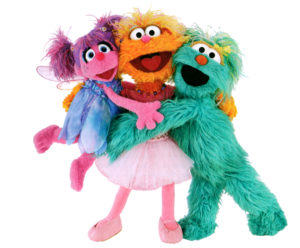 And if there are readers thinking this all sounds like too much to ask for? Let me give them two examples of shows that prove otherwise:
And if there are readers thinking this all sounds like too much to ask for? Let me give them two examples of shows that prove otherwise:
Fraggle Rock and Sesame Street.
I cannot emphasize how much Sesame Street does right. They always have from the start. Yes, the fact that the show has an agenda helps – that agenda being to educate kids by showing equality in genders (and races, classes, disabilities, religions, family dynamics, etc.). They’ve always had an equal representation of male and female characters, both as humans and puppets. True, the male characters get promoted a fair amount more and the ratio still tips in favor of the male characters, but the fact is Sesame has Prairie Dawn, Zoe, Rosita, Abby Cadabby, Segi, Julia, and several others and the showrunners push to bring female characters to the forefront time and time again.
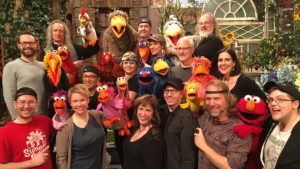 Not to mention the number of prevalent females working on Sesame is enormous compared to over with Muppet productions. In this current season, there are at least eight women writing for the show, a whole slew of them building puppets and costumes, and there are six wonderful women who puppeteer in the episodes – each having several characters to perform. Also, they’ve brought two women from other versions of Sesame – Boitumelo Betty Maretele from South Africa (Zuzu) and Ghazal Javed from India (Chamki) – to perform their characters on the American version of Sesame Street.
Not to mention the number of prevalent females working on Sesame is enormous compared to over with Muppet productions. In this current season, there are at least eight women writing for the show, a whole slew of them building puppets and costumes, and there are six wonderful women who puppeteer in the episodes – each having several characters to perform. Also, they’ve brought two women from other versions of Sesame – Boitumelo Betty Maretele from South Africa (Zuzu) and Ghazal Javed from India (Chamki) – to perform their characters on the American version of Sesame Street.
Then there’s Fraggle Rock, where two of the main characters are females being performed by amazing female puppeteers! Red and Mokey are allowed to be their own characters, not conforming to stereotypes, and they were flawed and complex characters. Not to mention they were seen as equals amongst the Fraggle community! Fraggle Rock also had several 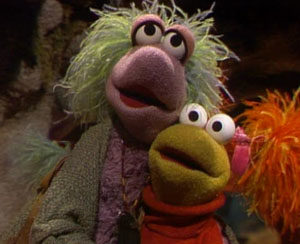 women on their writing staff and a handful of female performers. While there were certainly more men working on Fraggle, Mokey and Red (and Cotterpin!) each got plenty of episodes dedicated to themselves during every seasons’ run. Best of all, they had a positive friendship between the two of them.
women on their writing staff and a handful of female performers. While there were certainly more men working on Fraggle, Mokey and Red (and Cotterpin!) each got plenty of episodes dedicated to themselves during every seasons’ run. Best of all, they had a positive friendship between the two of them.
Obviously Fraggle Rock and Sesame Street strike a far different tone than the Muppet productions tend to, but don’t tell me it’s not possible when other shows have gone out of their way to promote women on screen and behind the scene so hard.
I want to reiterate now that I love the Muppets, and I’m in no way stating that they’re an awful franchise for not considering women. But. I mean. It’s 2018. It’s time. There are rumors circulating as to what the Muppets have next up their sleeve, and I can only hope they take some of what I’ve written about into consideration.
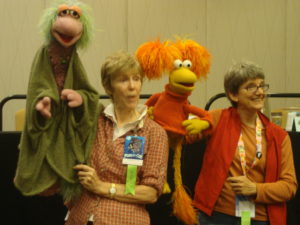 Give Yolanda more to do. Give Piggy a female friend and let there be little to no animosity between them. Let Janice have a solo arc away from her band. Bring Denise back as her own character – no romantic ties with Kermit. Make adult Skeeter a reality. Hell, bring back Spamela Hamderson and give her a personality more than just her boobs. Create new female characters – and let Julianne, Leslie, Stephanie, or any of the amazing women you have on call play them.
Give Yolanda more to do. Give Piggy a female friend and let there be little to no animosity between them. Let Janice have a solo arc away from her band. Bring Denise back as her own character – no romantic ties with Kermit. Make adult Skeeter a reality. Hell, bring back Spamela Hamderson and give her a personality more than just her boobs. Create new female characters – and let Julianne, Leslie, Stephanie, or any of the amazing women you have on call play them.
What’s more, hire women! Hire women of color! Hire queer women! Hire trans women! Hire disabled women! I can only speak for myself as a white, cis, queer woman, but there are so many other women who lack representation in the media, and bringing on a variety of women as writers, producers, directors, and performers, in the end, will only benefit the franchise.
I love the Muppets, and that is never going to change. I only hope to see more and more of myself, and other women, represented on screen in the years to come.
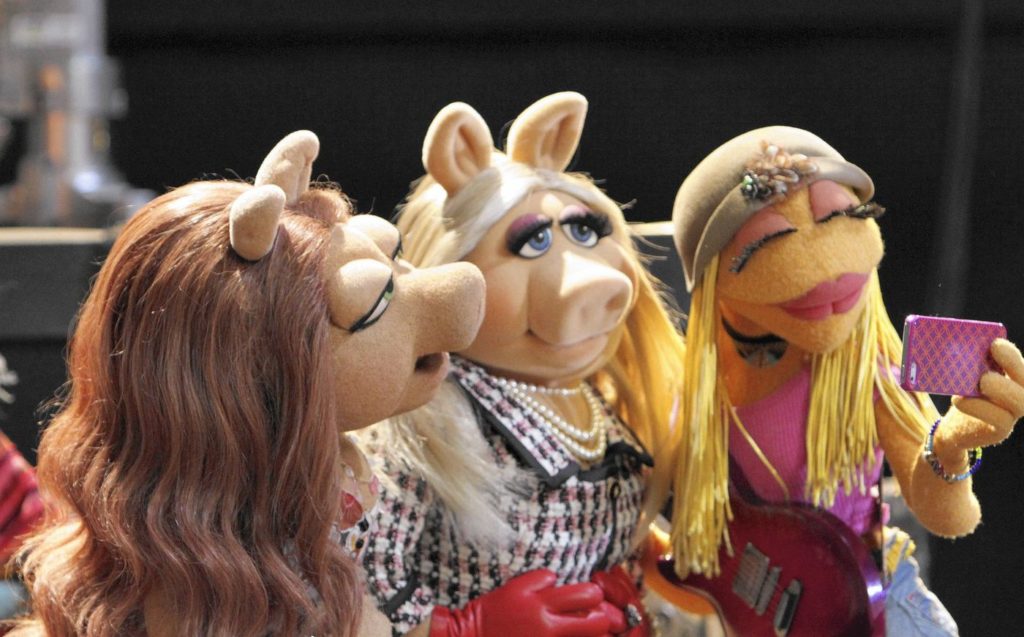
Click here to support amazing women in the Muppets on the Tough Pigs forum!
by Julia Gaskill

